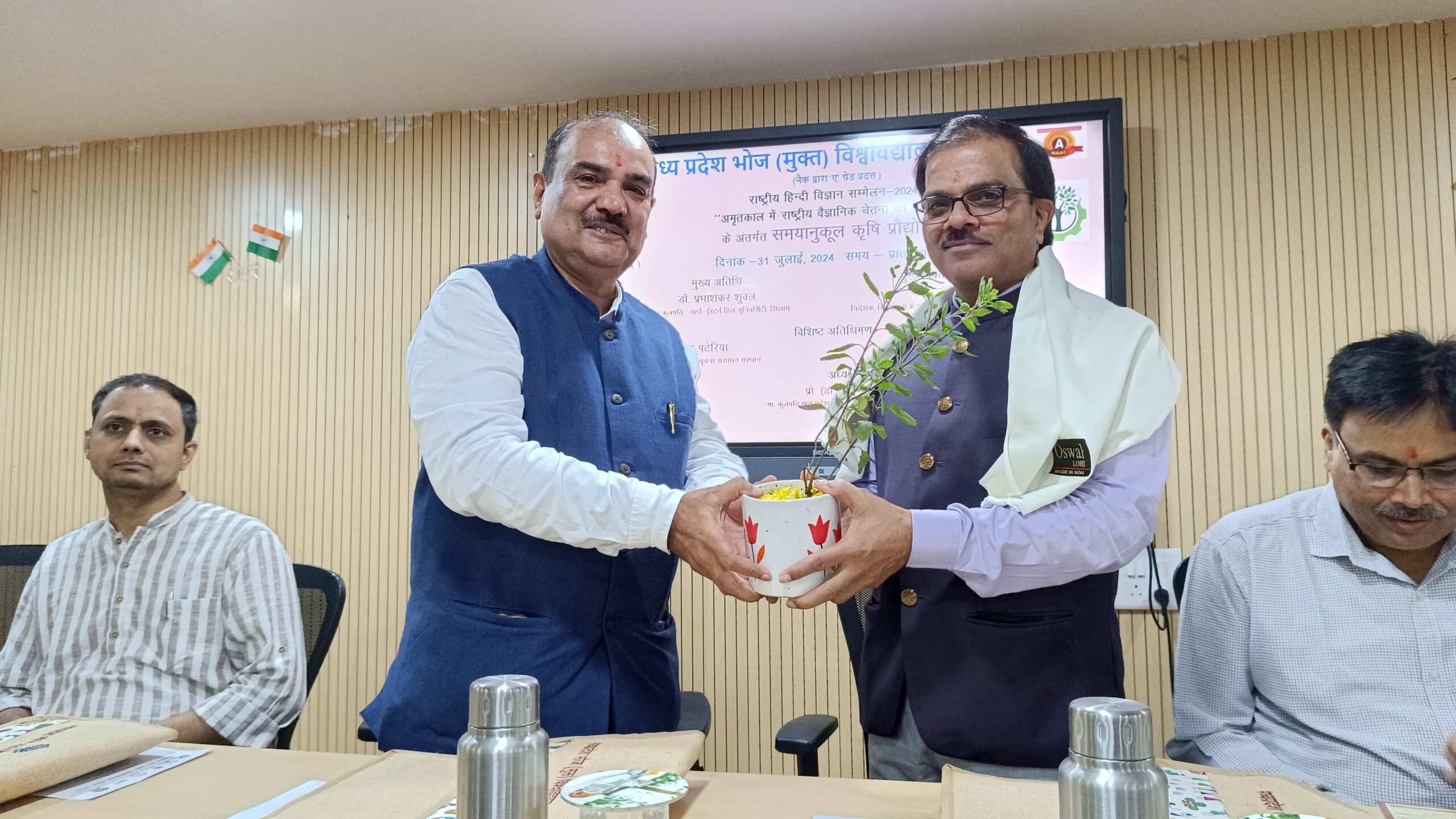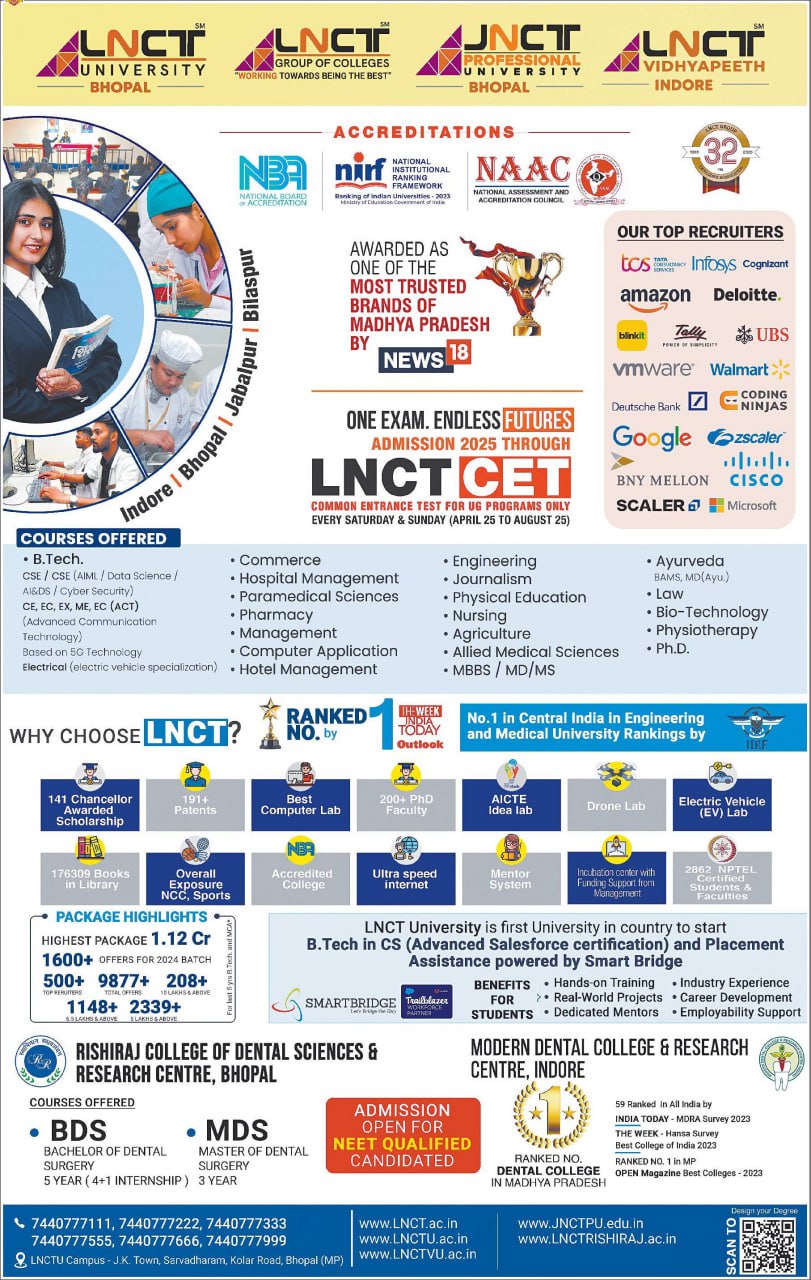CNN Central News & Network–ITDC India Epress/ITDC News Bhopal: A program was organized at Madhya Pradesh Bhoj Open University as part of the National Hindi Science Conference 2024. The theme of the program was “Timely Agricultural Technology” under the topic “Advancement of National Scientific Awareness in Amrit Kaal.” The event saw the participation of numerous experts in science and agriculture. The chief guest was Dr. Prabhashankar Shukla, Vice-Chancellor of North East Hill University, Shillong. Dr. N.K. Gupta, Director of Education at SKN Agricultural University, Jobner Jaipur (Rajasthan), was the keynote speaker and honored guest. Distinguished guests included Manoj Pateria, Director of the National Institute of Science Communication and Information Resources, Dr. Praveen Ramdas, Co-Organization Minister of Vijnana Bharati, New Delhi, and Sanjay Singh Kaurav, Provincial Secretary of Vijnana Bharati Madhya Bharat Pradesh, Chhattisgarh. The event was chaired by Prof. Sanjay Tiwari of Bhoj Open University, with Dr. Sushil Manderia, the university’s registrar and program coordinator, also in attendance.
In his address, Manoj Pateria mentioned that Patanjali University is conducting deep research on agriculture, which he recently learned about and expects positive outcomes. He highlighted the importance of sharing weather conditions that are particularly useful for agriculture. Pateria emphasized that although much work has been done in modern agriculture, more efforts are needed to reach new heights. He pointed out the transition from organic farming to natural farming, now commonly referred to as organic farming. He also stressed the importance of focusing on “Land to Lab” along with “Lab to Land,” suggesting that practical agricultural experiments could bring necessary changes and improve quality. He cited historical examples, such as the use of neem and lamps for grain preservation, as well as other significant agricultural practices.
Dr. N.K. Gupta, the keynote speaker, highlighted how Indian farmers exemplify agriculture under challenging conditions. He noted that even during the COVID-19 pandemic, Indian farmers ensured there was no shortage of grain across the country, despite the nation facing the pandemic’s impact. Gupta also shared insights into the lifestyle of Rajasthan farmers, who often engage in activities beyond agriculture, including wildlife conservation. He mentioned that Rajasthan uses minimal pesticides in agriculture, maintaining its long-standing agricultural tradition. Gupta emphasized the need for increased agricultural productivity, citing the projected requirement of around 100 million tons of food by 2047 to feed India’s growing population, estimated to exceed 1.7 billion.
Sanjay Singh Kaurav stressed the importance of communicating scientific knowledge in the mother tongue, particularly in agriculture. He advocated for the “Land to Lab” concept, suggesting that understanding and addressing farmers’ issues should be a primary goal of science. Kaurav emphasized the need for farmers to be educated about new agricultural techniques, such as using drones for organic spraying, and highlighted the importance of natural farming.
Dr. Praveen Ramdas spoke about “Swadeshi Science,” emphasizing science for India and in Indian languages. He underlined the importance of teaching science in the mother tongue, especially for effective communication in India. Ramdas acknowledged the contributions of past farmers in Madhya Pradesh and stressed the agricultural roots of India.
Chief guest Dr. Prabha Shankar Shukla discussed the reluctance of the younger generation to work in agriculture and the challenges this poses for the future. He emphasized the importance of promoting organic farming and improving agricultural practices to meet future food demands. Shukla highlighted the importance of multilingualism in scientific communication and shared examples of welcoming phrases in various languages. He also noted the need for efficient packaging of high-quality grains and the significance of water in agriculture.
Prof. Tiwari reflected on India’s journey towards agricultural self-sufficiency, recalling historical challenges such as food shortages. He discussed the importance of agricultural advancements and the role of government schemes like PM Kisan in supporting farmers. Tiwari advocated for the use of mother tongue in all sectors to achieve national growth and highlighted the need for modern agricultural knowledge.
Dr. Sushil Manderia expressed his views on agriculture, emphasizing the availability of vast arable land in India. He shared insights on traditional methods used by ancestors to predict weather and make farming decisions. The program was conducted by Dr. Ratan Suryavanshi, Director and Nodal Officer of the event, and concluded with a vote of thanks by Dr. Manderia. The event was attended by university officials, teachers, staff, and students.







